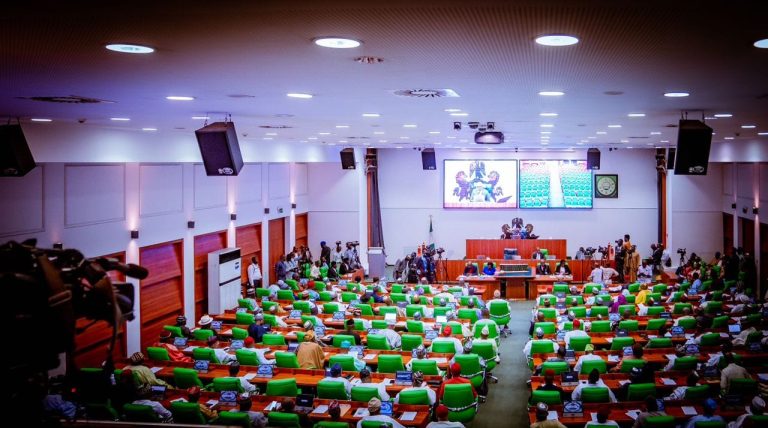From Ndubuisi Orji, Abuja
The House of Representatives is proposing the creation of no fewer than 302 new seats in the national and state Assemblies for women and Persons With Disabilities (PWDs) in the ongoing review of the 1999 Constitution.
The proposed new parliamentary seats contained in two separate bills with the Speaker Tajudeen Abass and his deputy, Benjamin Kalu, as lead sponsors, include 86 seats in the two chambers of the National Assembly and 216 special seats in the 36 state Houses of Assembly, which shall be exclusively for women and PWDs.
The two bills, which have already been approved for second reading and referred to the House Committee on Constitution, are seeking to alter Sections 48,49,71, 77, 91 and 117 of the Constitution. The proposed legislations, if eventually passed into law, shall become effective after the expiration of the lifespan of the current National and State Houses of Assembly in 2027.
The Bill on special seats for PWDs is sponsored by Abbas, and titled: “A Bill for an Act to further alter the Constitution of the Federal Republic of Nigeria, 1999 (as altered) to provide for special seats for the physically challenged persons in Nigeria’s federal, state and local government legislative houses and for related matters,” HB. 1931.
The proposed legislation, according to its explanatory memorandum, is aimed at addressing inadequate representation of physically challenged persons in legislatives houses in the country, by creating special seats for them in the three tiers of government “so as to be able to advocate for policies peculiar to their members, among other things.”
It stipulates that the special seats for the PWDs shall consist of one Senate and one House of Representatives seat to be drawn from each of the six geopolitical zone in the country, making a total of 12 seats in the National Assembly and three special seats in each of the 36 state House of Assembly for PWDs.
The proposal also includes creation of one councillorship position for PWDs in each of the 774 local government councils across the country.
The proposed legislation states that the National Assembly seats for the PWDs shall rotate every four years among the states that make up each geo-political zone.
Similarly, the proposed legislation for special seats for women sponsored by Kalu and 12 others and titled: “A Bill for an Act to alter the provisions of the Constitution of the Republic of Nigeria (1999) to provide for seat reservation for women in the National and State Houses of Assembly, and for related matters,” HB 1349 is seeking to alter sections 48,49,71, 77, 91 and 117 of the Constitution.
Specifically, the bill is seeking the substitution of Section 48, 49 and 91 of the Principal Act with a new section 48 which provides thus: Composition of the Senate (1) The Senate shall consist of – (a) three Senators from each State and one from the Federal Capital Territory; and (b) one additional Senator for each State and for the Federal Capital Territory, who shall be a woman.
Notwithstanding the provisions of subsection (1) of this section, nothing shall prevent a woman from contesting for any of the Senatorial seats under subsection (1)(a).
“Composition of the House of Representatives:(1) Subject to the provisions of this Constitution, the House of Representatives shall consist of – (a) three hundred- and sixty-members representing constituencies of nearly equal population as far as possible, provided that no constituency shall fall within more than one State; and (b) one additional member for each State of the Federation and the Federal Capital Territory, who shall be women.
“Notwithstanding the provisions of subsection (1) of this section, nothing shall prevent a woman from contesting for any of the seats in the Federal constituencies referred to in subsection (1)(a). (3) The provisions of subsection (1)(b) shall commence after the life of the current National Assembly and shall be reviewed sixteen years after its commencement.”
“Composition of the House of Assembly -(1) Subject to the provisions of this Constitution, a House of Assembly of a State shall consist of – (a) three or four times the number of seats, which that State has in the House of Representatives divided in a way to reflect, as far as possible, nearly equal population; and (b) one additional member from each of the three senatorial districts in the State under section 48(1)(a) of this Constitution, who shall be a woman: Provided that a House of Assembly of a State shall consist of not less than twenty-four and not more than forty-three members.
“Notwithstanding the provision of subsection (1) of this section, nothing shall prevent a woman from contesting for any of the seats in the Federal constituencies referred to in subsection (1)(a) of this section.”
The proposed legislation, according its explanatory memorandum “seeks to remedy the low representation of women in Legislative Houses by providing for special constituencies to be contested and filled by women as a temporary measure to promote women’s political representation.”
According to the bill, the women’s seats, if created, shall subject to a review “after four general election cycles of sixteen years for the purpose of either retaining, increasing, or abolishing the temporary measure.”
